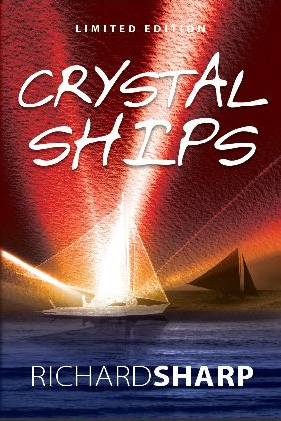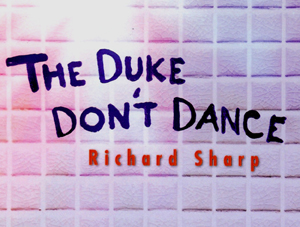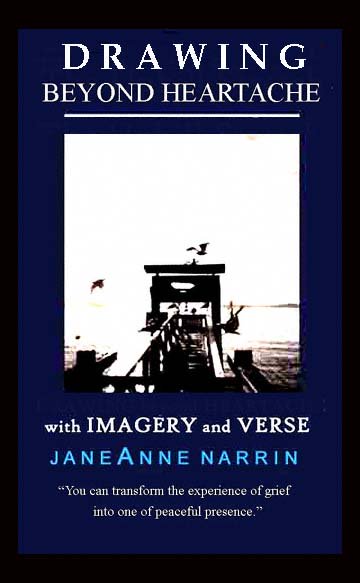UNREPENTANT
WRITING ON THE GENERATIONS

Richard Sharp is Unrepentant
we talk about
CRYSTAL SHIPS
 |
Crystal Ships might be regarded as a companion piece to Sharp’s prize-winning Indie novel, The Duke Don’t Dance as it is equally immersed in the popular culture and politics of its time. But unlike The Duke Don’t Dance which paints a picture of a generation, Sharp’s latest novel focuses on a specific period -- 1960-1978.
You will find that it reveals the spirit of this period, encompassing tragedy, social and cultural perspectives, and humor. Dedicated to the survivors it must be. |
SAGE: Many of our readers have opened the playbook of life against the backdrop of monumental events. Do you believe we have “unwittingly encapsulated” the very spirit of these times?
SHARP: Oh, I think during those
times, we had no idea
what we were doing and most of us, like the protagonists in my novel
were torn
between the older values and the changes that were coming. Few in the
Sixties
and Seventies were truly a part of the counter-culture (a small minority
of all
age groups) but many sampled drugs,
loved some of the new music, read the books that were considered
controversial and the positive sides of changing gender and racial
perspectives. It
was a transitional period in American life and, though none of us really
saw
ourselves as “transitional,” we surely were. So, yes, I think that is a
fair
description of my protagonists.
SAGE: How would you describe the overall feeling of Crystal Ships?
SHARP: I would call
it an impressionist portrait of a troubled era.
Crystal Ships is literary/historical fiction. While the novel involves a
murder and other incidents that become clear only toward the end of the story,
the novel is not written as a mystery. That is, it does not focus primarily on
a crime solver’s search for the explanation of a crime.
SAGE: How does the story unfold?
SHARP: It follows the lives of perhaps three male and four male central characters through America’s decades of discontent, the troubled 1960s and 1970s, as they seek some resolution or understanding of traumatic events or search for ways to overcome the burdens of the times and find new inspirations.
SAGE: Tell
us about the general “tone” of Crystal Ships.
SHARP: To me it says something about the resilience
of the human spirit in overcoming difficult times and in maintaining pride in
oneself and those who shared many of the same experiences, despite your own condemnations
of the times as you lived through them and the later stereotyping of the era.
SAGE: How
you were able to carry a graphic description of violent rape to elicit strength
in its aftermath?
SHARP: I’ve known women who have been through terrible
experiences, including sexual assault, and have had the “mixed blessing” of
being the recipient of the emotional dump that sometimes follows (many guys
will know what I mean by mixed blessing). But women are doubtless more
resilient than men. Beyond that, I admire strong women writers. My advice to
guys who want their female characters to be authentic and not fantasies is to
“man up” and read the top women’s literature.
SAGE: As I read Crystal Ships, I became aware that you
manage to create “edgy” characters, but still
softened their outlines . There were no exaggerated heroes and villains. How did you manage to do this?
SHARP: I ground all of my characters in
their negative traits and then try to figure out how they are able to
rationalize their bad habits as being OK. They don’t have to convince the
reader to like them, because from their own point of view there’s nothing not
to like (or at least nothing they can do about their idiosyncrasies.) I then
give the reader enough of each character’s point of view that they might find
some sympathy or understanding.
SAGE: Readers are introduced to your rare humor in the
context of a time and culture throughout Crystal Ships.
We see this in your
writings at The Sage Companion. How would you say you happened to come by your
unique, and often cathartic, sense of humor?
SHARP: Sometimes I think I should write
fortune cookies that contain actual fortunes, not just bad advice, old saws and
flattery. Two of my favorite fortunes are “You will get over it” and “You will
make bail.” The best humor comes out of relief from bad outcomes--past, present
or anticipated. Bad things happen to everyone, but regret is pointless. It’s
better to learn and laugh.
SAGE: Many of our readers, like you, have lived through the
times you describe-- riots,
assassinations, drugs, gender conflicts, rock and roll, and the Vietnam War …
what take-aways or lessons might we perceive as we read Crystal Ships?
SHARP: Somewhere in the novel, a character says something like “things happen for a reason, just not always any good reason.” Sure, you can learn some things from what went wrong in the Sixties and Seventies and you can appreciate the good things. I happen to think the progress in gender and racial equality was a great thing and I loved the creativity of the period in music and other parts of the culture. But some stuff was just random bad luck and you’ll never figure it out, no matter how many conspiracy theories and morality plays you dream up.
Move on.
That’s a good take away from any era.
##
YOU CAN FIND ALL OF RICHARD SHARP'S NOVELS AT POWELLS
ONWARD
WRITING ON THE GENERATIONS
unrepentant2
" Much writing on generations is pseudo-science, over-generalizing as to the extent to which those in any given time period share common values, arbitrary as to the start and end birth dates of a given 'generation' selective as to alleged tendencies of successive generations, and ignoring that a generation may evolve over time.
About the stereotypes, generalizations tend to be based on
the supposed characteristics of those born in the early parts of a supposed
generation, the clichés becoming less plausible for those born later."
Richard Sharp
|
unrepentant2  |
unrepentant2 “Greatest Generation” The term “Greatest Generation,” for example, was chosen to honor those who overcame both the Great Depression and World War II, but is most applicable to those born in the first half of the 1910s and were adults in both periods.(see photo) Those born later, still children in the 1930s and the foot soldiers of World War II, were less central in shaping the course of events of those eras. |
“Silent Generation” and "Baby Boomers"
The name “Silent Generation” was initially applied to those coming of age in the conservative 1950s, supposedly reflecting the alleged passivity of those not having to confront the challenges of their predecessors.
Again, however, the label became broadly applied to those who were merely children in the period giving rise to the name. The same is true for the Baby Boomers, supposedly the spoiled products of American prosperity and the permissive child-rearing advice of Dr. Spock and immersed in the indulgences of the sixties. Again, many lumped into this group came of age only after the conditions giving rise to the name were passing. A “boomer” born in 1960 was raised in a quite different environment than one born in 1946.
For well over a century Americans have lived through periods of rapid change. A catchy label applied to those born in a given time period cannot capture the essence of everyone. Apart from different circumstances applicable to specific year of birth of birth, socio-economic status, ethnicity, gender and regional conditions make huge differences in attitudes and behavior. Even such factors as whether you are the younger or older child contribute to which sets of values you might adopt. (Although some of my older siblings who might be thought to have more greatest generation values acted a lot more like stereotype boomers. Go figure.)
unrepentant2
unrepentant2
If The Duke Don’t Dance has a message, it is “don’t be tied down by the negative stereotypes of your generation.” If they say your generation was spoiled and self-indulgent – well, just not you. I’m talking to you, boomer! They say you were silent and passive – did you ever hear of sex and drugs and rock and roll, moron? OK, old codger, they said you were the greatest, so you’ve got no complaint about that – but they also call your generation, sexist, racist and a lot off other stuff.
Well, whether you were or you weren’t – people change over time. We make transitions – be as modern as you want to be and be unrepentant!
LET ME KNOW YOUR VIEWS-- not just those of the Silent Generation, but also Baby Boomers (conventionally b. circa 1946-1965) and those still proudly representing the Greatest Generation (let’s say, 1906-1925).
Fans- Comment at my author site or contact Richard Sharp http://ow.ly/ePhru
unrepentant2
RICHARD SHARP BIO & Book Review
 |
FOLLOW THE AWARD-WINNING Richard Sharp " I do not buy into MLK,Viet Nam and Such |
THANK YOU FOR SHARING ON BEING SAGE
follow on Twitter | friend on Facebook |follow on Pinterest |forward to a friend
Collect Sage Companion Practical Arts eBooklets on Kindle
SITE SEARCH
HOME ABOUT US DISCLOSURE SPONSORS DONATE SITEMAP
Disclaimer: The nutritional and health information provided on this site is for informational and educational purposes only. It is not intended to be used as a substitute for professional advice of any kind. This information is not intended to diagnose, treat, prevent or cure any illness. Your use of this website indicates your understanding and agreement with these terms.
R E T U R N T O T H E F R O N T P A G E
aging-in-place, age in place












